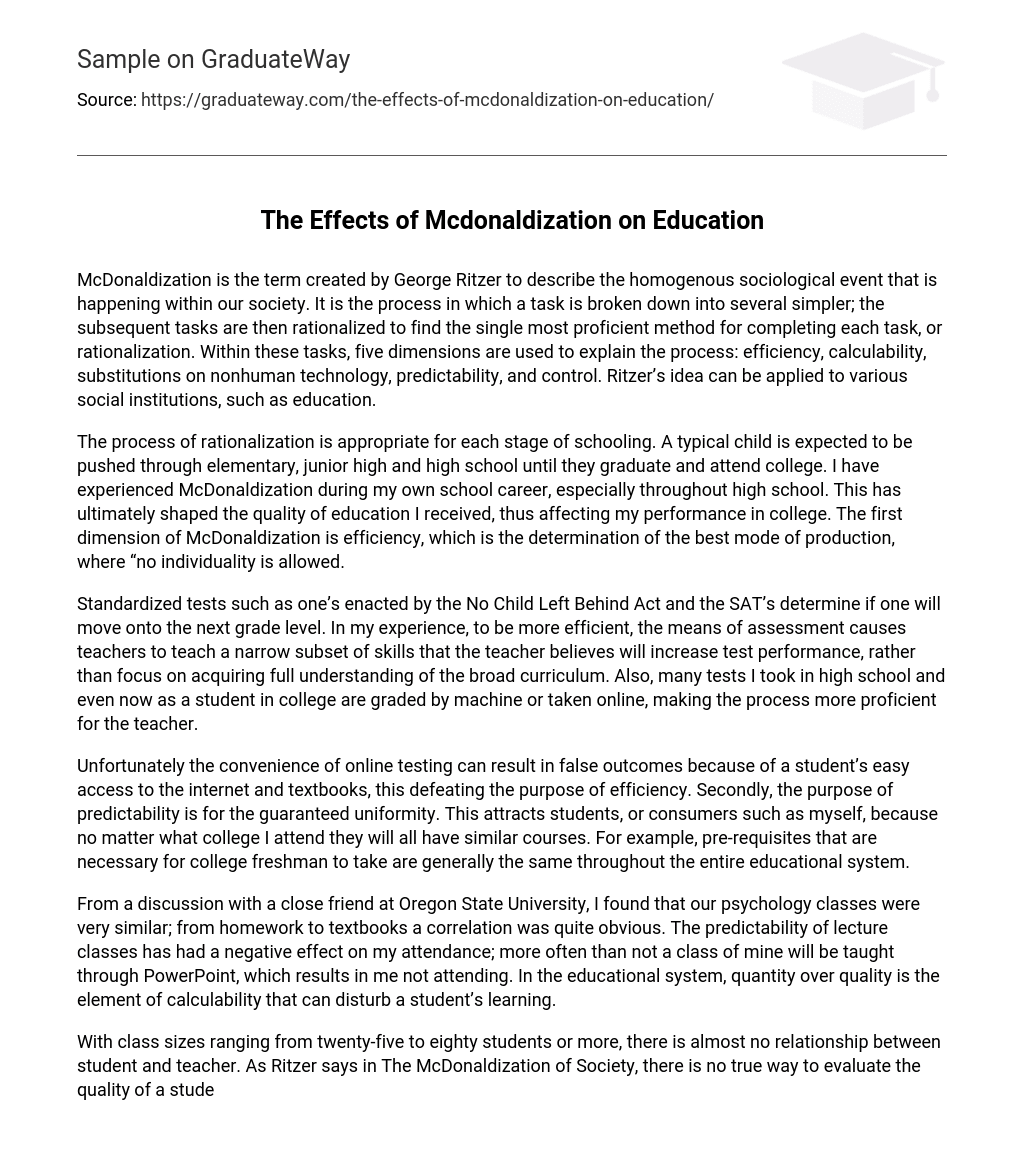McDonaldization is the term created by George Ritzer to describe the homogenous sociological event that is happening within our society. It is the process in which a task is broken down into several simpler; the subsequent tasks are then rationalized to find the single most proficient method for completing each task, or rationalization. Within these tasks, five dimensions are used to explain the process: efficiency, calculability, substitutions on nonhuman technology, predictability, and control. Ritzer’s idea can be applied to various social institutions, such as education.
The process of rationalization is appropriate for each stage of schooling. A typical child is expected to be pushed through elementary, junior high and high school until they graduate and attend college. I have experienced McDonaldization during my own school career, especially throughout high school. This has ultimately shaped the quality of education I received, thus affecting my performance in college. The first dimension of McDonaldization is efficiency, which is the determination of the best mode of production, where “no individuality is allowed.
Standardized tests such as one’s enacted by the No Child Left Behind Act and the SAT’s determine if one will move onto the next grade level. In my experience, to be more efficient, the means of assessment causes teachers to teach a narrow subset of skills that the teacher believes will increase test performance, rather than focus on acquiring full understanding of the broad curriculum. Also, many tests I took in high school and even now as a student in college are graded by machine or taken online, making the process more proficient for the teacher.
Unfortunately the convenience of online testing can result in false outcomes because of a student’s easy access to the internet and textbooks, this defeating the purpose of efficiency. Secondly, the purpose of predictability is for the guaranteed uniformity. This attracts students, or consumers such as myself, because no matter what college I attend they will all have similar courses. For example, pre-requisites that are necessary for college freshman to take are generally the same throughout the entire educational system.
From a discussion with a close friend at Oregon State University, I found that our psychology classes were very similar; from homework to textbooks a correlation was quite obvious. The predictability of lecture classes has had a negative effect on my attendance; more often than not a class of mine will be taught through PowerPoint, which results in me not attending. In the educational system, quantity over quality is the element of calculability that can disturb a student’s learning.
With class sizes ranging from twenty-five to eighty students or more, there is almost no relationship between student and teacher. As Ritzer says in The McDonaldization of Society, there is no true way to evaluate the quality of a student’s “understanding or overall ability. Instead, the sole measure of the quality of most college students is their grade in a given course and their grade point averages,” I could not agree more. A poor test score due to a bad day should not reflect the overall performance of a student prior to the assessment.
The internet has revamped education. The substitution of nonhuman technology, such as the internet, is used for the lack of human predictability and for greater control of tasks. For instance, attaining a college degree right from the comfort of your own home, by being taught from a computer, has never been easier. Being a college freshman, the transition from having all of my homework physically handed to me to most of it being online, has been a difficult one. Constantly checking online for assignments, grades, etc. has proven to be a major aspect of college life.
I have also discovered that a majority of communication between professors and myself is done through email; which has been helpful and hurtful. The final and fifth dimension is very similar to the substitution of nonhuman technology. Except this dimension, control, if focused on the “uncertainty of social life,” says Ritz. Just as the dean of a college has control over the professors, the professors have control over the curriculum, and the curriculum controls what the student learns. Class time, duration and expectations direct how much a student will learn in a short term or semester.
The first time I heard a professor announce that two or more absences would result in an expulsion, frightened me. The amount of control resting in my teachers’ hands worries me because it is my future. McDonaldization impacts higher education greatly. In my opinion, it is in a negative way. Ritz’s theory has a consequence of the irrationality of rationality. This is a significant result of the many downfalls of the five dimensions throughout his theory. Unfortunately, higher education turning into a form of a fast-food restaurant is not benefiting the consumer, or the broke college student.





